Computing & IS
Over 300 Graduate under Mak-Amity University & e-VBAB Online Education Program
Published
3 years agoon
By
Jane Anyango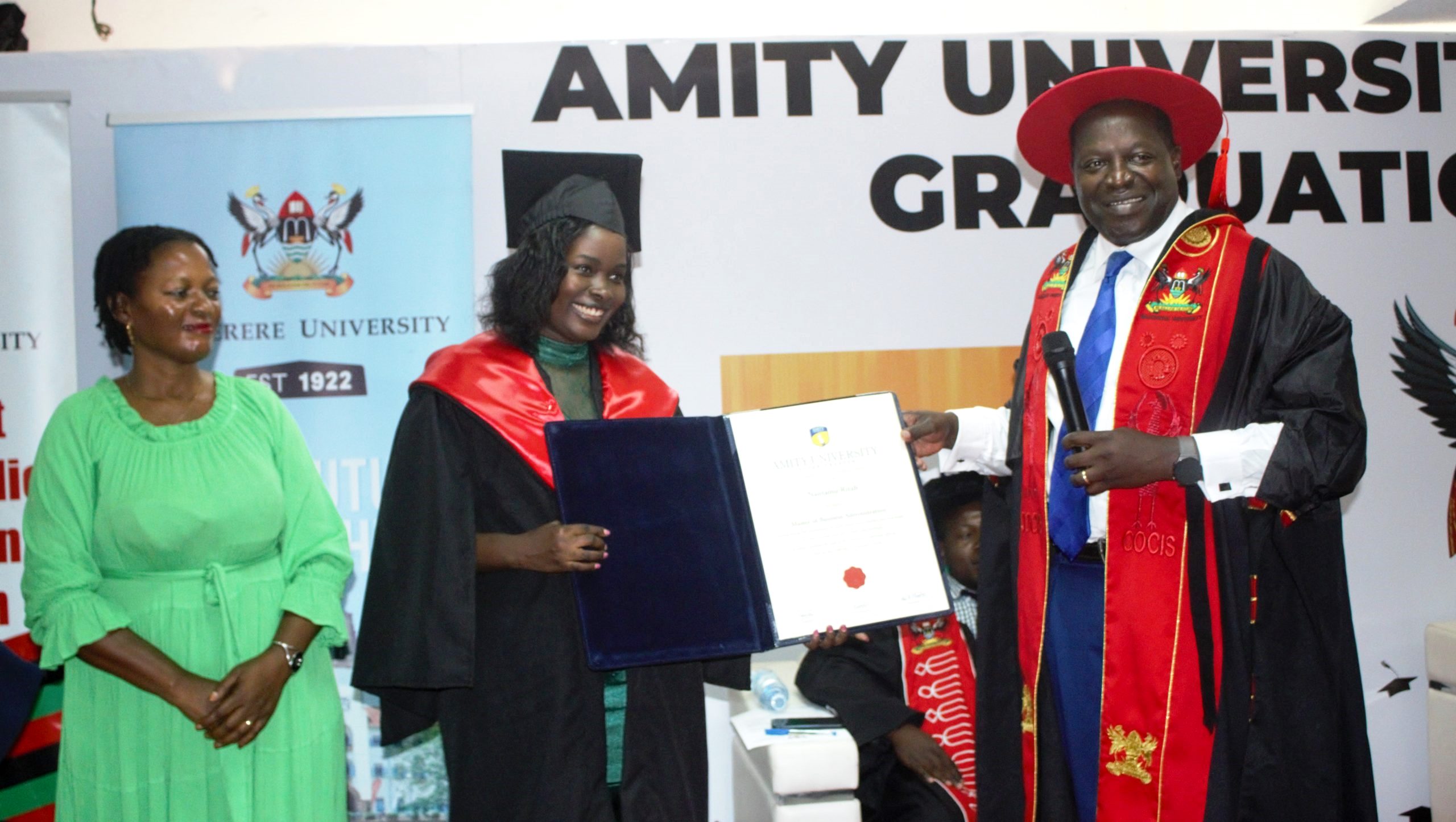
Over 300 candidates who pursued online education under the Makerere and Indian universities agreement have been Awarded Diplomas and Degrees at a colourful ceremony that was held at the College of Computing and Information Sciences (CoCIS).
The ceremony held on 14th April 2023 was presided over by the Principal CoCIS Prof. Tonny Oyana on behalf of management and attended by his Deputy Dr. Peter Nabende and Dr. Kyanda Swaib who represented the Dean School of Computing and Informatics Technology.
In 2018, the Government of Uganda and the Government of India signed an MoU geared towards the implementation of the e-Vidybharati and e-Aarogyabharati (e-VBAB) projects in Uganda. To promote the activities of this project, Makerere University was chosen to serve as a regional centre to advance Tele –education in the East African region.
The current running MoU between Amity University, and Makerere University College of Computing and Information Sciences was negotiated in the year 2018 and, is renewable after five years while the e-VBAB project MoU was signed in 2019 for five years, and is still running until the end of 2024.
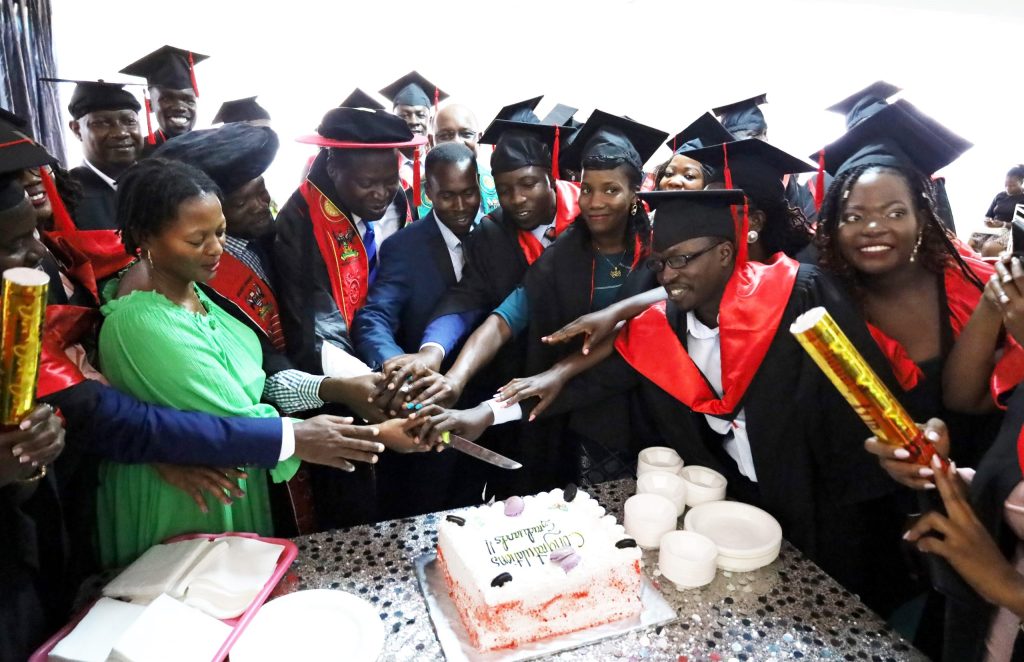
The e-VBAB Network Project set up an e-Learning Centre at the College of Computing and Information Sciences(CoCIS) well equipped for use with a modern video conferencing laboratory with two programmes namely, Amity–Makerere University and the e-Vidybharati and e-Aarogyabharati (e-VBAB) Makerere project.
The primary goal of this partnership was to espouse online teaching and learning as well as offer degree and postgraduate degree programmes at affordable tuition fees rates devoid of functional fees.
Under both the e-VBAB project and the MoU between Amity and Makerere University several students were enrolled on various courses offered by premier Indian universities offering a number of programs including tourism management, French, Business Management, physical science engineering, IT, Financial literacy, Human Resource, Business analytics.
A total of 2,100 students have been enrolled under both the Amity-Makerere MoU and the e-VBAB programmes. Of these, 1,346 students were enrolled on 100% scholarship under the e-VBAB project from 2020 to date, spread across 28 Indian universities. Under the Makerere -Amity University MoU, a total of 754 students have been admitted under partial scholarships of up to 70% since 2018 across ten intakes.
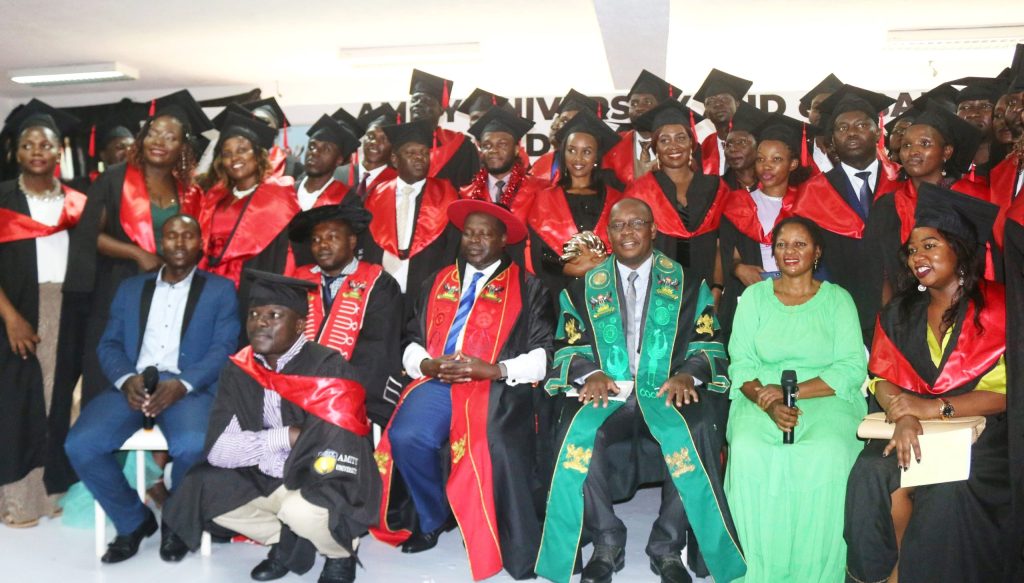
Under these MoUs, the college churned out 339 graduates of these, 185 are under the Makerere–Amity University agreement and 154 under the e-VBAB project.
The virtual graduation ceremony for the cohort of students who enrolled on programs offered by the mentioned universities was held for different groups since 2019 in India. A total of 381 students from Uganda were awarded Master, PGD and Ordinary Diploma qualifications.
Speaking during the award ceremony Prof. Tonny Oyana thanked the parents and spouses of the candidates for being supportive. He recognised the Indian government and taxpayers for offering scholarships and subsidised education.
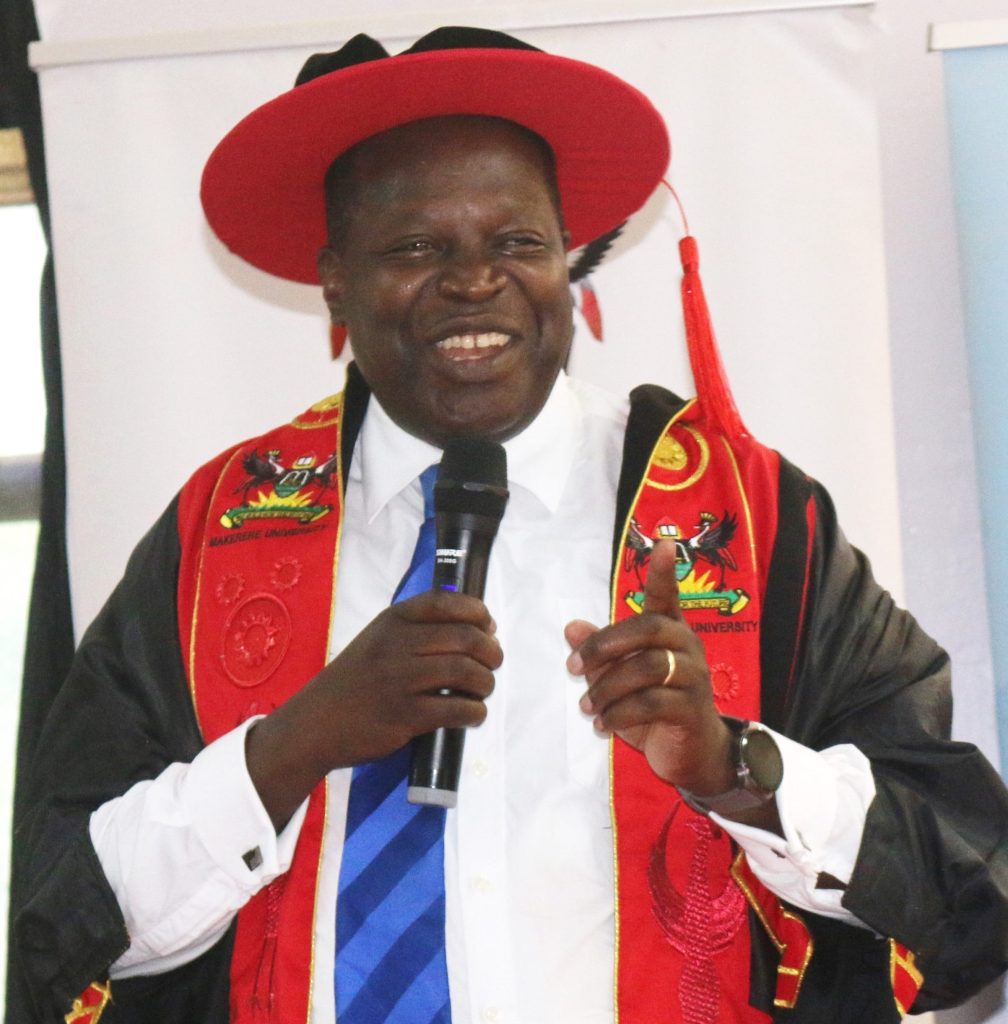
Prof. Oyana credited members of the faculty, the head CIPSID and the e-Learning coordinator for a job well done.
He told the congregation that the college organised the Degree Award ceremony to celebrate this milestone and academic brilliance.
“Education is not an easy journey. I thank you all for your endurance. Many times when you are beginning it is exciting. When a lecturer announces a test, your heart starts to beat and some people drop off during the process, but you are strong-hearted, the strong-willed and you have endured thank you for staying in the course and that is why we are celebrating here”. He added
The Principal further advised graduands to be kind and loving as they move out of the gates of Makerere and always to remain humble as they advance in their careers.
Prof. Oyana implored parents to motivate their children adding that the celebration starts at nursery school.
Speaking on behalf of the Academic Registrar Makerere University, Prof. Oyana thanked all, for sparing their valuable time to witness the graduation.
The Deputy Principal CoCIS, Dr Peter Nabende congratulated the graduands upon this achievement noting that the degrees attained are just a beginning and that, there was more learning to do.
“Your degrees have come through online learning. It means that already there is a skill you have acquired and take further”
Nabende appreciated the Indian government and all stakeholders for supporting the candidates in their academic journey.
The tele-education coordinator Ronald Mwanje described the day as special not only for the graduates but also for the institutions and the world as a whole.
“We are here to celebrate the achievements of the students who have worked hard over the years to complete their studies successfully. I want to congratulate each and every one of you for your dedication and commitment to your studies, which have brought you to this milestone. Your hard work, perseverance, and determination have paid off, and you can now stand tall, proud of all that you have accomplished”. Mwanje said
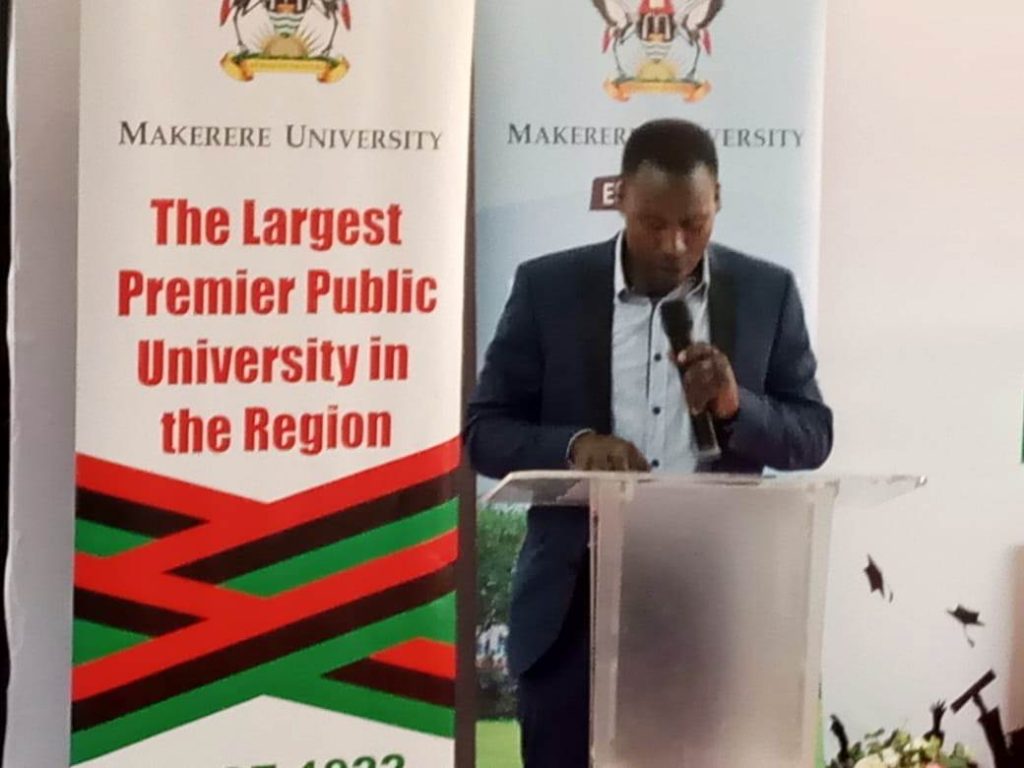
Mwanje also recognized the efforts of the faculty members who have worked tirelessly to support and guide the students throughout their academic journey, noting that their expertise, guidance, and mentorship have been invaluable in shaping the students’ careers and ensuring that they have the necessary skills and knowledge to succeed in their chosen fields.
He said the partnership between Amity University and the EVBAB project has been instrumental in providing quality education to the students in Uganda. Since its inception in 2018, the project has aimed to create a sustainable model for higher education delivery in East Africa. The project has collaborated with Makerere University’s CoCIS to provide high-quality education, leveraging technology and modern teaching methods.
Through the EVBAB project, Amity University has been able to share its expertise in online and distance education with students in Uganda, providing them with an opportunity to access quality education that may have been otherwise impossible. This project has also enabled the students to develop global perspectives and enhanced their employability, contributing to the growth of the local and regional economies.
“The partnership between Amity University and Makerere University’s CoCIS has been fruitful, resulting in the successful completion of various programs, including Bachelor’s, Diplomas, Master, and PG Diploma. The students who have completed these programs are well-equipped with the skills and knowledge necessary to contribute to their fields and society as a whole”, he stressed
Online education according to the coordinator has revolutionized the method of teaching and learning by making education more accessible, flexible, and cost-effective and also opened up opportunities for students to learn from top universities around the world, regardless of their location, and provided a platform for students to engage with diverse perspectives and
As the e-learning coordinator for this project, Mwanje said he has witnessed first-hand the students’ dedication and hard work in completing their studies, seen them overcome various challenges, including the COVID-19 pandemic, which disrupted education worldwide exhibiting resilience, adaptability, and a commitment to their studies, which have enabled them to complete their programs successfully.
“The graduates of today are a testament to the success of the e-VBAB project, the partnership between Amity University and Makerere University’s CoCIS, and the commitment of the students and faculty members. You have worked hard to reach this milestone, and I am confident that you will go on to achieve great things in your careers and personal lives”
“As you graduate today, I want to remind you that your education does not stop here. It is only the beginning of a lifelong journey of learning and personal growth. You have gained knowledge and skills that will serve you well in your chosen fields, but there is still much to learn and achieve. I urge you to continue to seek knowledge, explore new ideas, and be open to opportunities that come your way”. He advised
Graduands advised being Compassionate, Courageous and Creative
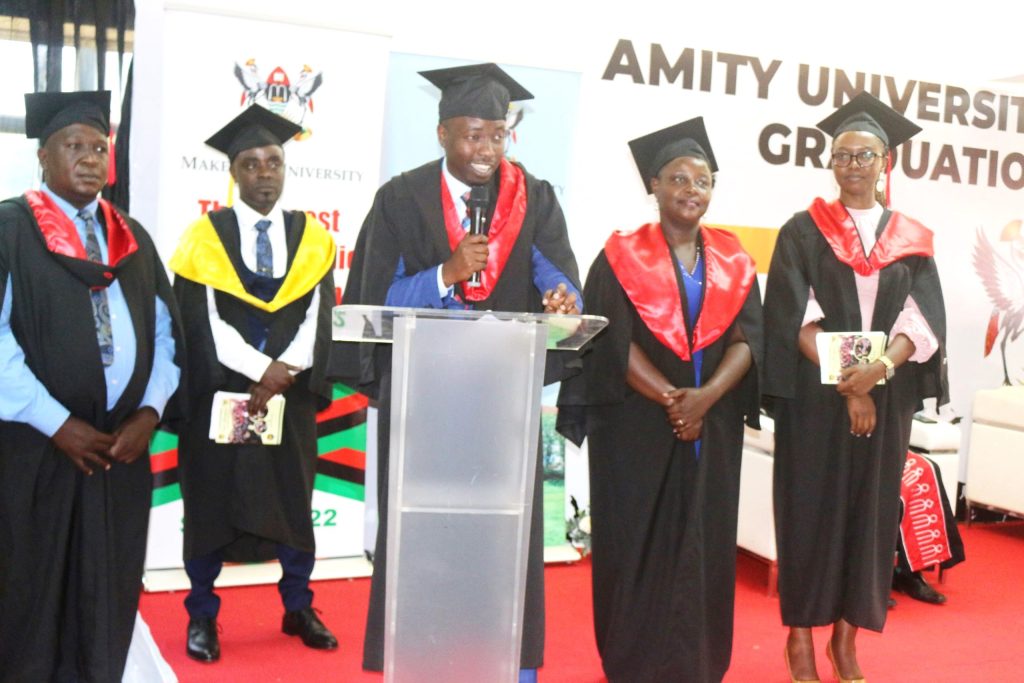
Representing the graduating students, Mayonza Bob reminded students that education is the most powerful weapon that can transform their lives, the communities and the world at large adding that once with great power comes with responsibilities, and they must use their education not only for their benefit but for the benefit of society.
“As we embark on our journey into the world, I urge you to remember these three Cs that is, Compassion, Courage and Creativity. Compassion is the foundation of a just and equitable society. The ability to understand and share the feelings of others and to act with kindness and empathy. In a world that is increasingly divided by politics, religion and ideology, we need more compassion than ever before”, Mayonza advised.
Mayonza described courage as the fuel that drives progress, the willingness to take risks, to speak truth to power and to stand up for what is right even when it is unpopular or difficult. As they navigate the challenges and obstacles that lie ahead, Mayonza implored fellow graduands to remember that courage is not the absence of fear, but, the triumph of it, so they must be brave and courageous.
Creativity according to Mayonza is the engine of motivation, the ability to think outside the box and see things in a new light and imagine a better future. As they embark on their careers, Mayonza advised that whether in business, science, art or any other field, they should remember that creativity is not a gift installed upon the few, but a skill that can be learned and cultivated, so they should be cautious.
“It means creating an inclusive environment where everyone feels valued and respected, where the voiceless are heard and where their contributions are recognised. It means investing in education and training programmes that help individual owners and organisations to stand tall against all odds and representing communities to develop skills of their unprivileged and networks that help nations and communities.”
Mayonza also advised graduands to embrace diversity in all forms and to be agents of change in their communities and workplaces whether they have or are pursuing a career in business, management a degree, or a postgraduate.
You may like
-


Makerere University commemorates 13 transformative years of partnership with Mastercard Foundation
-


Celebrating Academic Excellence: CoBAMS Presents 975 Graduands at Mak 76th Graduation Ceremony
-


Mak 76th Graduation Ceremony: CoNAS Presents 16 PhDs & Best Performing Male Student in the Sciences
-


Medical graduates urged to uphold Ethical values
-


CAES Presents Overall Best Performing Student in the Sciences & a Record 28 PhDs at the 76th Graduation Ceremony
-


Graduation marks the next phase of accountability, graduates told
Computing & IS
Makerere Launches Scholarly Guide, Calls for Increased Research, Publication and Innovation in Africa
Published
3 weeks agoon
February 12, 2026By
Jane Anyango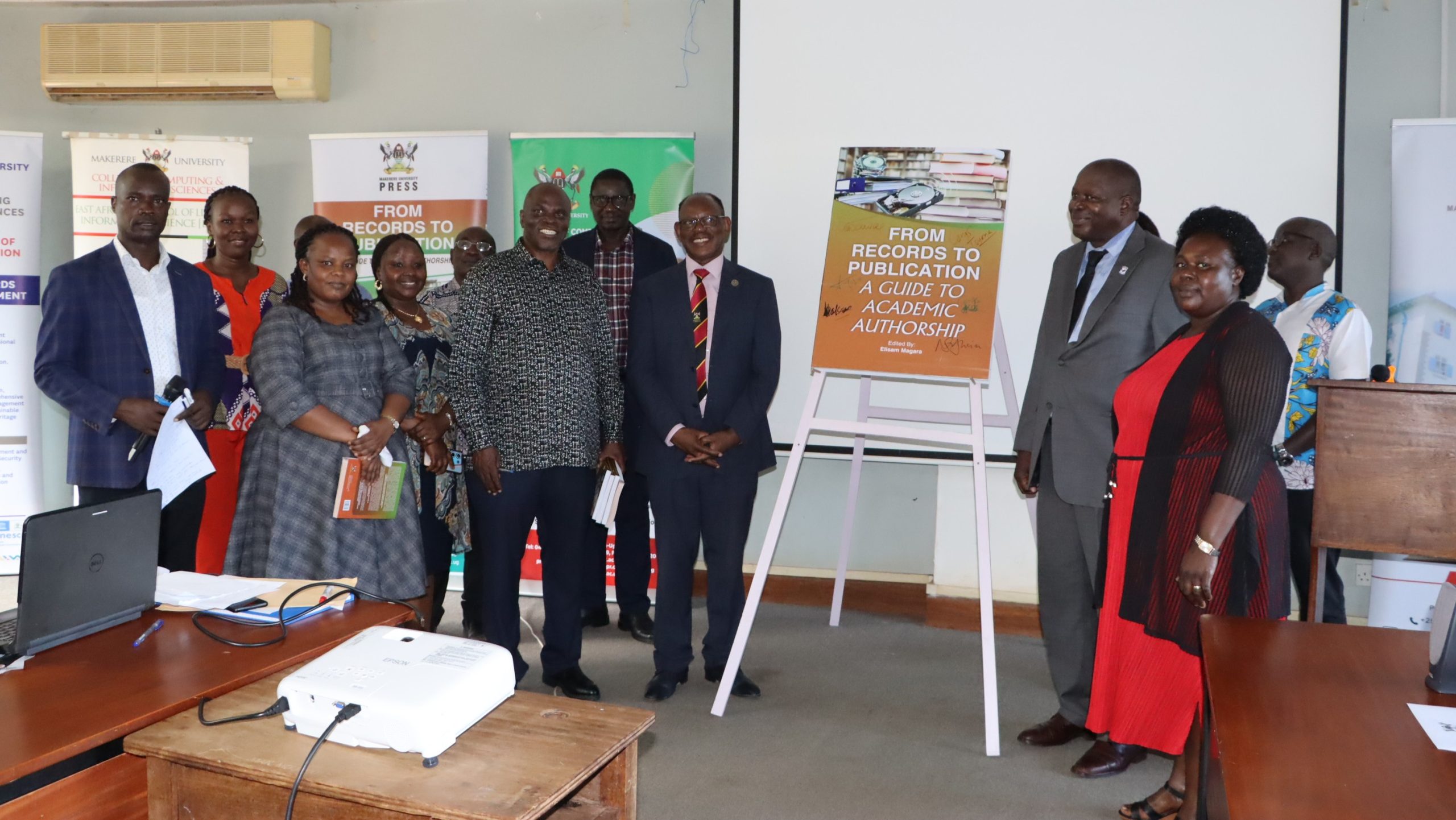
VC Emphasizes Research as Key to Africa’s Global Integration
Makerere University Vice Chancellor, Prof. Barnabas Nawangwe, has urged universities across Africa to invest in research, publication, and innovation as a pathway to greater participation in the global knowledge economy.
Speaking at the launch of From Records to Publication: A Guide to Academic Authorship, edited by Prof. Elisam Magara of the East African School of Library and Information Sciences, Prof. Nawangwe highlighted Africa’s low contribution to global scholarship. “Although Africa accounts for 15 percent of the world’s population, it produces only 3 percent of global research publications,” he said.
“There are historical reasons for this,” the Vice Chancellor continued, referencing centuries of slavery and colonialism. “You cannot brush away 600 years of subjugation. And we Africans have not even written enough about that. If we want to move Africa back into the global community, we must invest in research, publication, and innovation.”
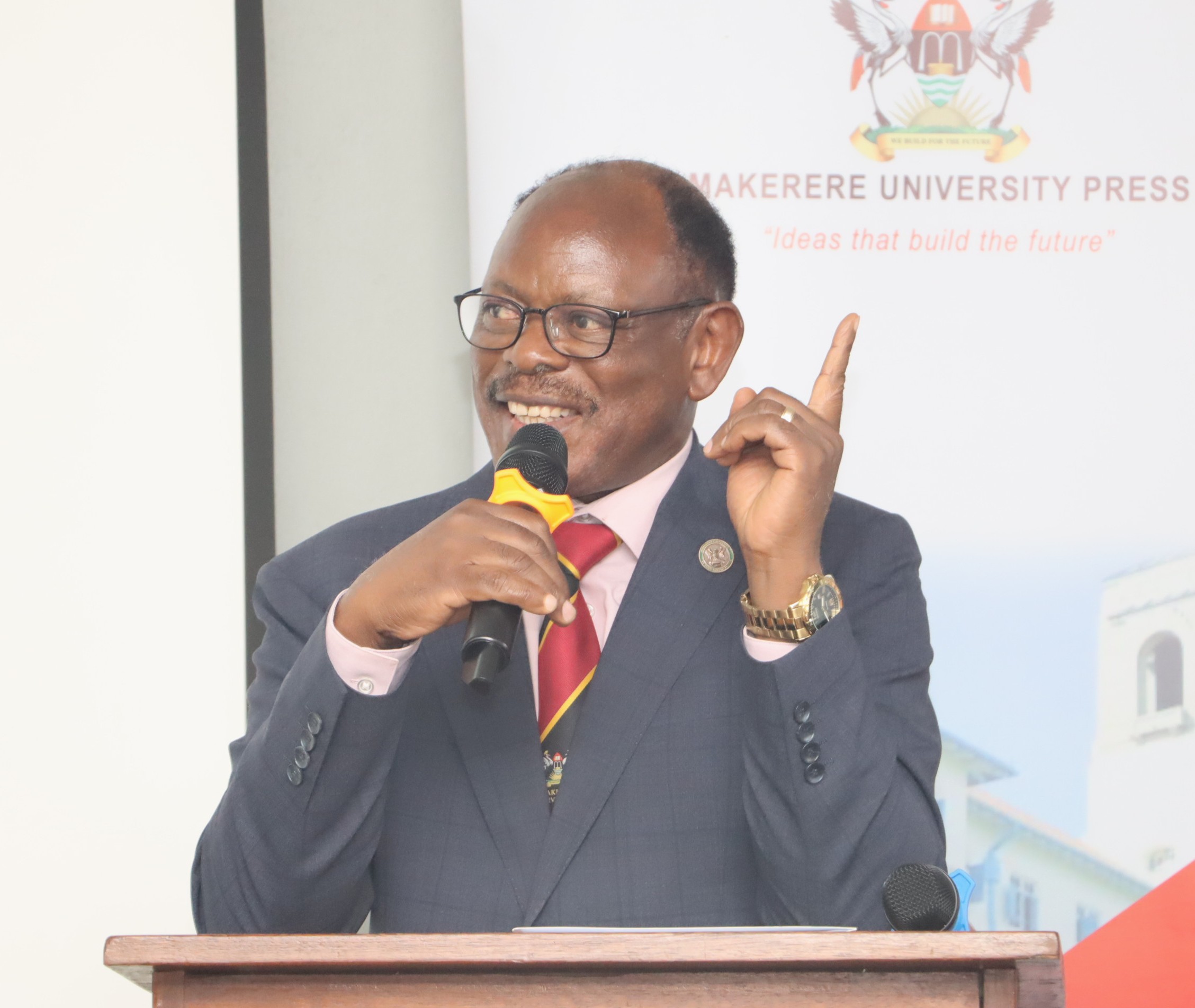
He cited China as an example, noting how the country’s investment in research and education has translated into economic and global influence. “When we say China is the factor of the world, it is not that people just wake up and begin making things. They invest in education, in publication, in research. If we want to transform Africa, we must do the same.”
Prof. Nawangwe highlighted Makerere’s progress, revealing that annual peer-reviewed publications have grown from about 500 a decade ago, to 700, and now exceed 2,000. He acknowledged that the university still trails South African institutions, partly because they operate numerous local journals that absorb significant volumes of research. “We are not fully utilising the brand of Makerere University Press,” he said, pledging support to strengthen the press and scale up journal production.
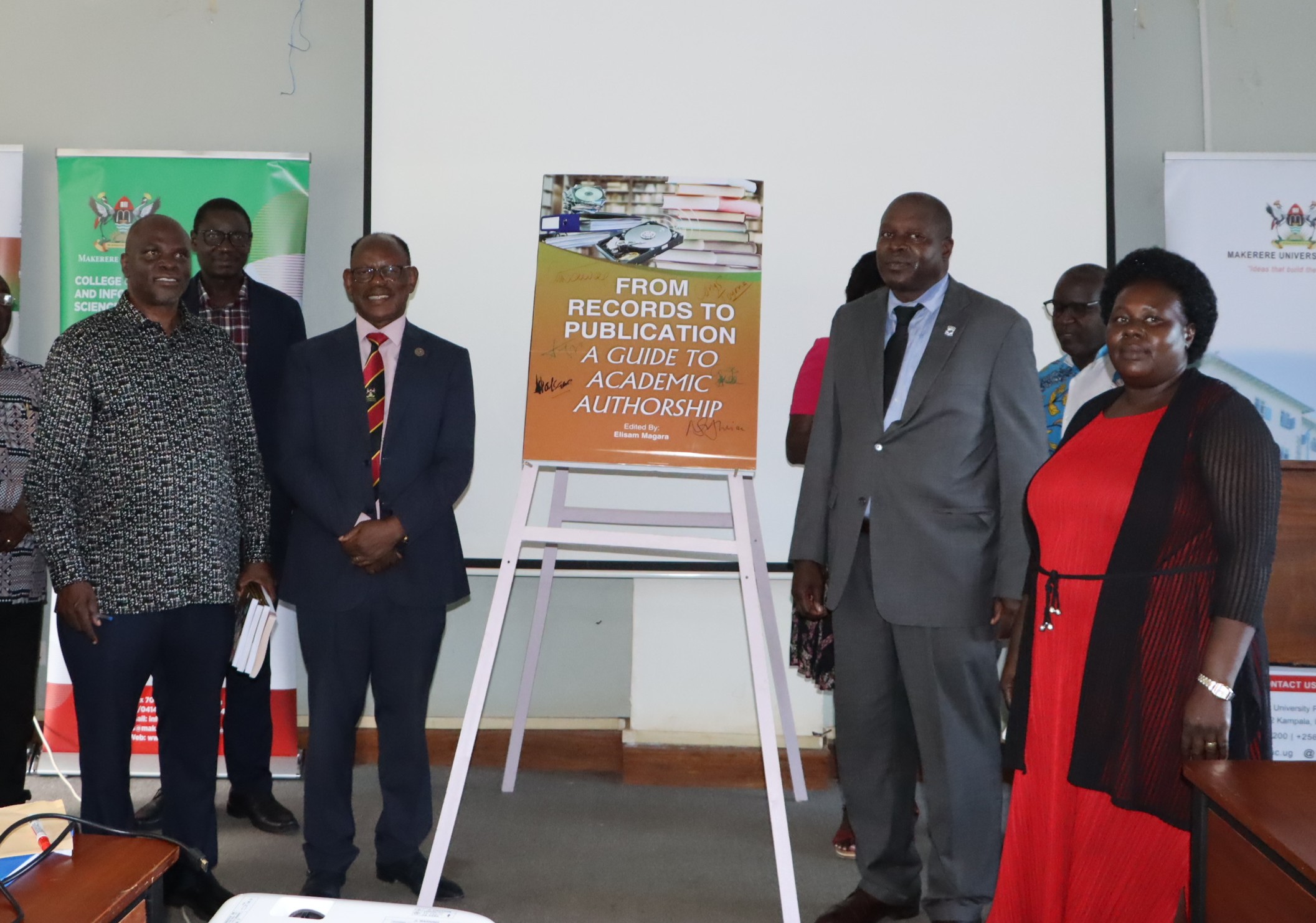
He also reaffirmed the university’s strategy to reduce excessive undergraduate enrolment and expand graduate training to boost research output. “Let us create time for professors to do research and supervise more graduate students,” he said.
Commending Professor Magara and his team for producing the authorship guide, Prof. Nawangwe described the book as an essential handbook for Master’s and PhD students, early-career researchers, and universities across the region striving to become research-led. “This is at the heart of the university. If we invest in research and publication, we secure our future,” he said.
Book Recommended as Mandatory Guide by College Principal
Makerere University’s Principal of the College of Computing and Information Sciences, Prof. Tonny Oyana, called for the newly launched volume to be adopted as a mandatory guide for graduate students and newly appointed lecturers. “This is not a bad book for our first-year PhD students to start with,” he said. “Even those who are hired as junior lecturers still need mentorship. If I were the Vice Chancellor, I would put this book as required reading for every new hire.”
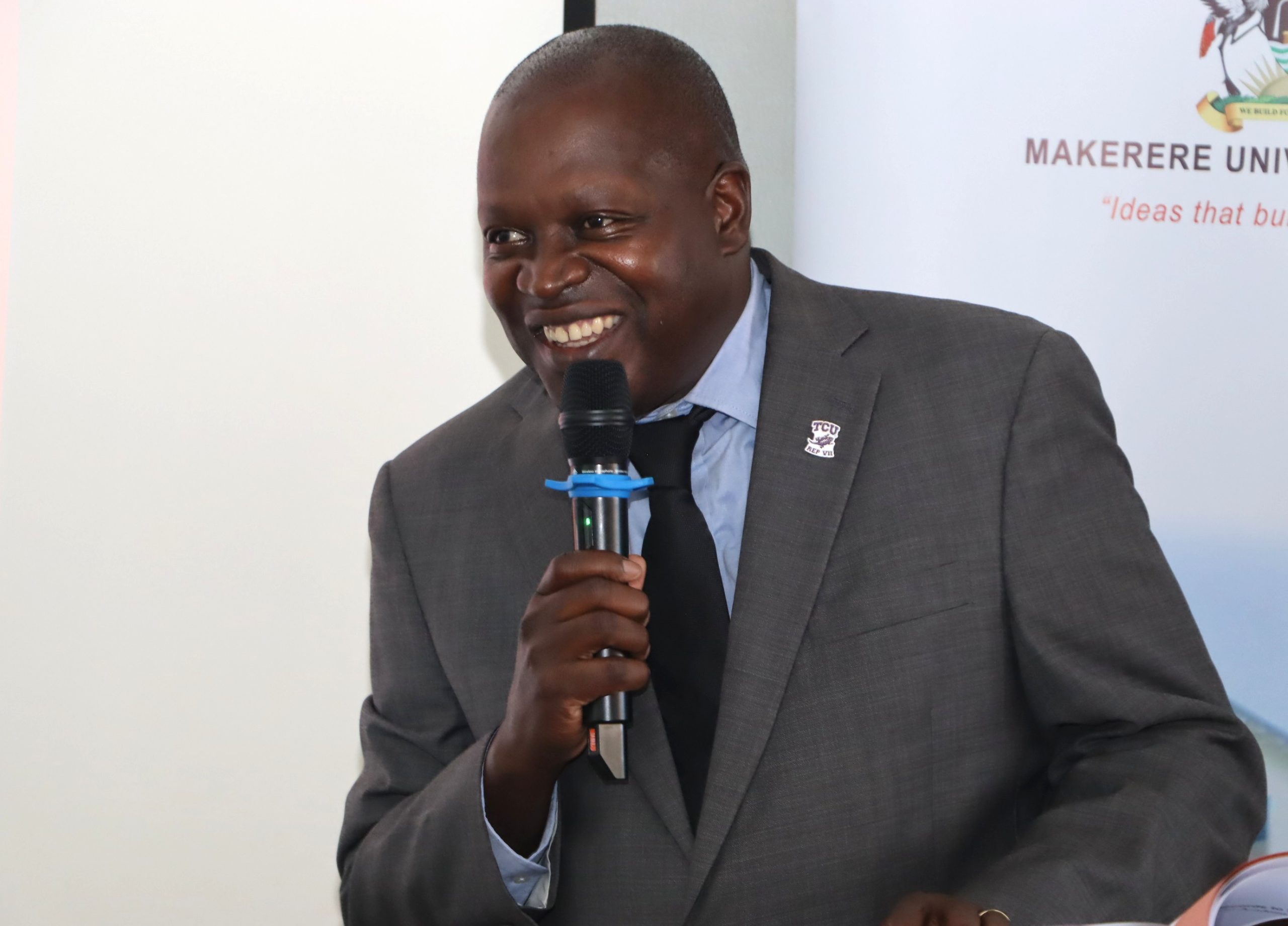
Prof. Oyana reflected on his personal contribution to the book, revealing that administrative responsibilities nearly forced him to withdraw. “Because of the work that I do, I was about to give up,” he admitted. “But Professor Magara was persistent. He came back to me and gave me more time.”
He credited a PhD student, Caroline Ilako, for assisting with library research and literature reviews, saying, “She did a wonderful job. We went back and forth through revisions, but finally we produced the work.”
On the quality of the book, Prof. Oyana said, “When you pick up a book, look at how it is laid out. The quick judgment tells you about the quality. This is well put together. We are beginning to show quality comparable to Western presses.”
He also challenged traditional notions of “publish or perish,” noting, “As scholarship evolves, those who evaluate scholarship must also adjust. Impact, innovation, and tangible products are increasingly valued alongside journal articles.”
Editor Highlights Research-Based Approach
Prof. Elisam Magara, the book’s editor, explained that the guide is designed to support scholars from the moment they conceive a research idea to the point their work is published and read. “I looked at the books we were using and asked myself: which kind of book can truly guide students? We needed a clear guide from the time a scholar thinks of writing up to the time the book is read,” he said.
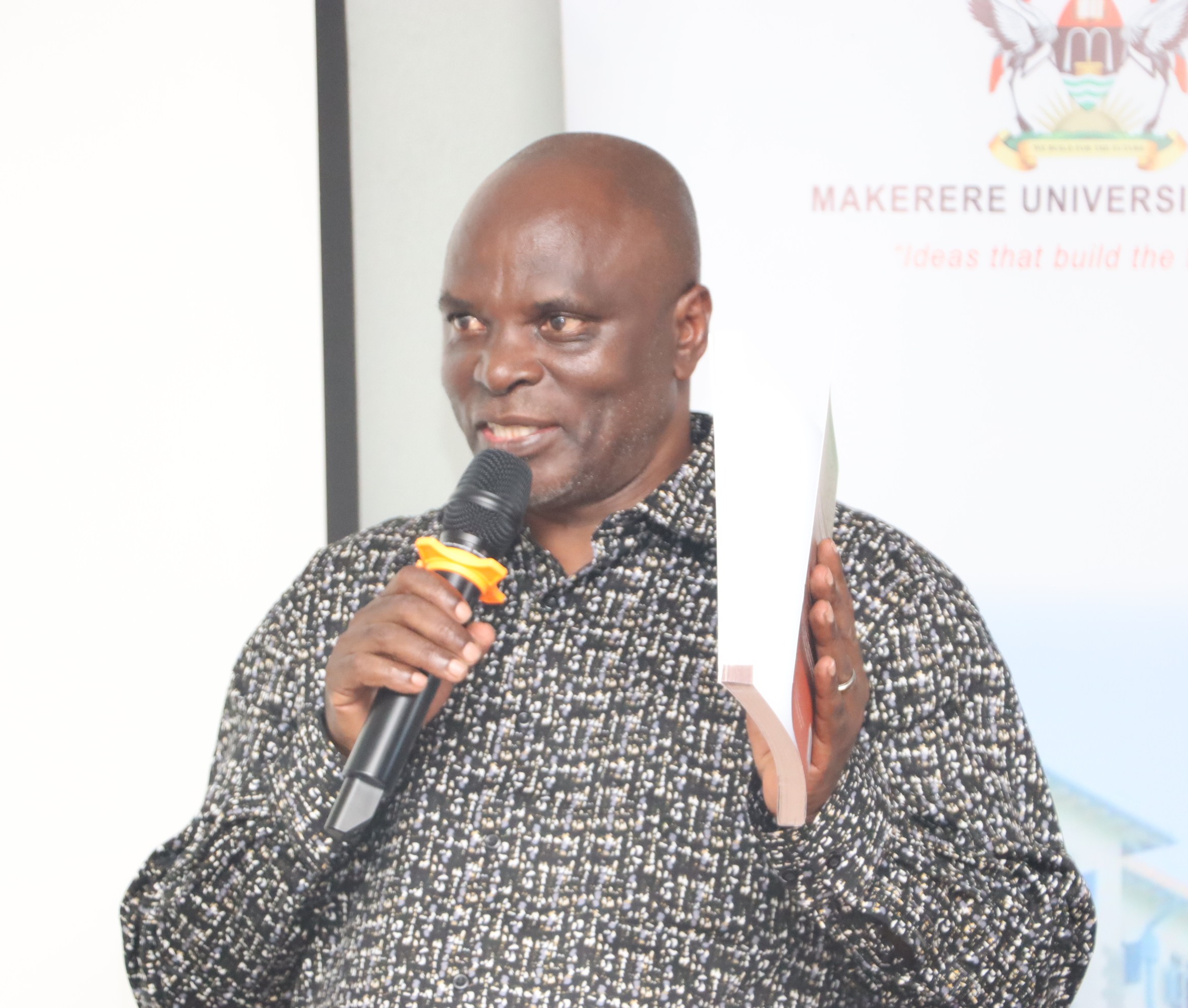
He detailed the rigorous editorial process that began in 2022, including international calls for contributions, peer review of abstracts, writeshops for feedback, and multiple rounds of chapter reviews. “Don’t write and keep,” he advised. “Your book must have impact. It must reach the public and be used.”
Prof. Magara also acknowledged the sabbatical granted by the Vice-Chancellor, which enabled him to balance teaching and editorial responsibilities. “This book is meant not just for Makerere but for scholars across the region and beyond,” he said.
Mak Press Outlines Rigorous Publishing Process
Dr. Isaac Tibasima, representing the Managing Director of Makerere University Press, explained the publication pathway. “Once you bring your manuscript to the press, we take it through evaluation, external peer review, revisions, copy-editing, typesetting, and pre-press review before printing,” he said.
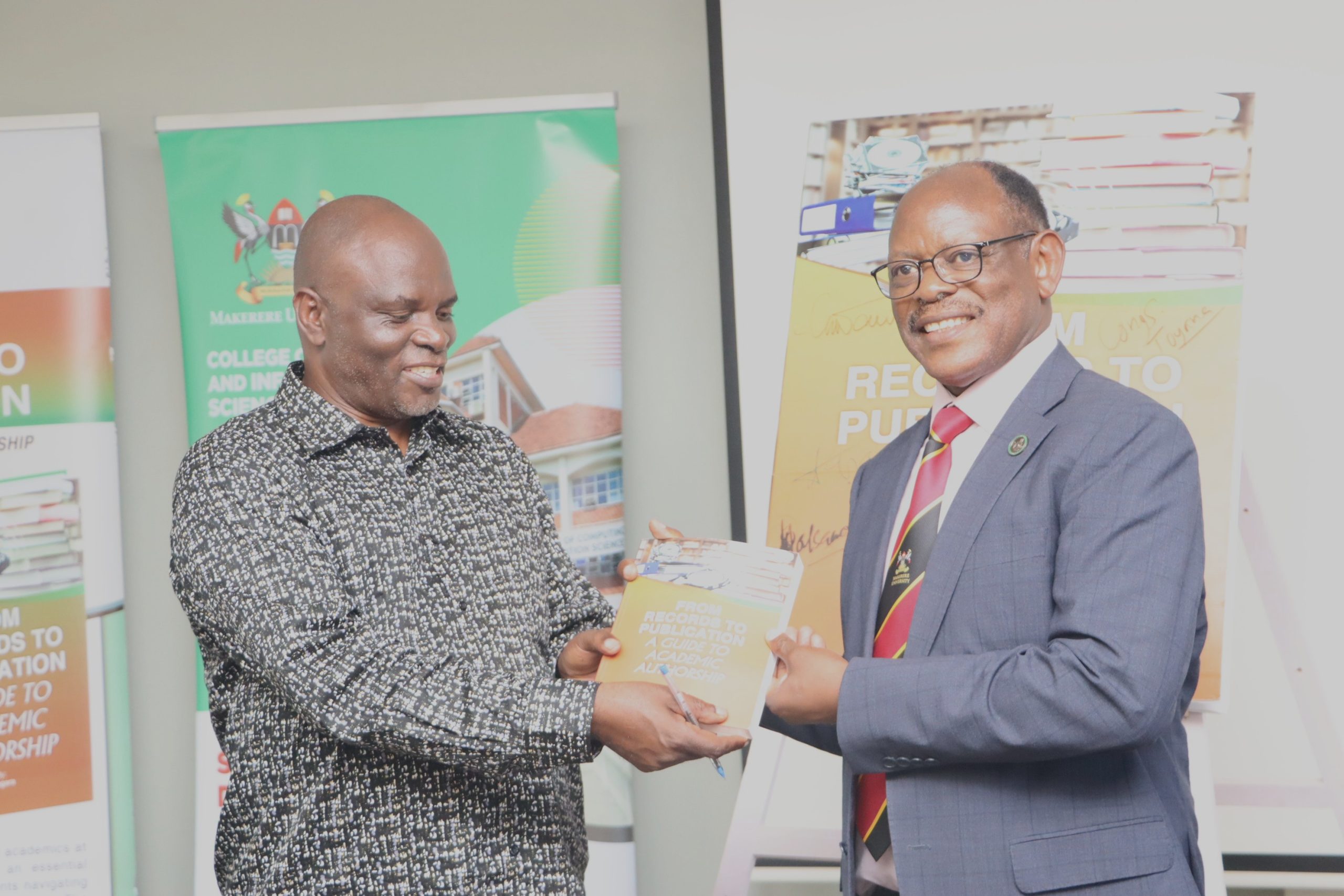
He also highlighted the press’s efforts to strengthen college-based journals. “We will not run the journals, but they will be published under the imprint of Makerere University. If we produce consistent issues, we can then move toward global indexing,” Dr. Tibasima said.
All new journals and articles now carry Digital Object Identifiers (DOIs) to enhance discoverability, while past publications are being retroactively assigned DOIs. “We are not there yet, but we are moving there, and we are intentional about getting there,” he added.
School Leaders Celebrate Scholarship and Mentorship
In welcome remarks, Dr. Sarah Kaddu, Dean of the School, said, “This event is a celebration of scholarship, intellectual discipline, and the journey of knowledge creation. This book speaks directly to one of the most critical challenges facing scholars—transforming research records into publishable work.”
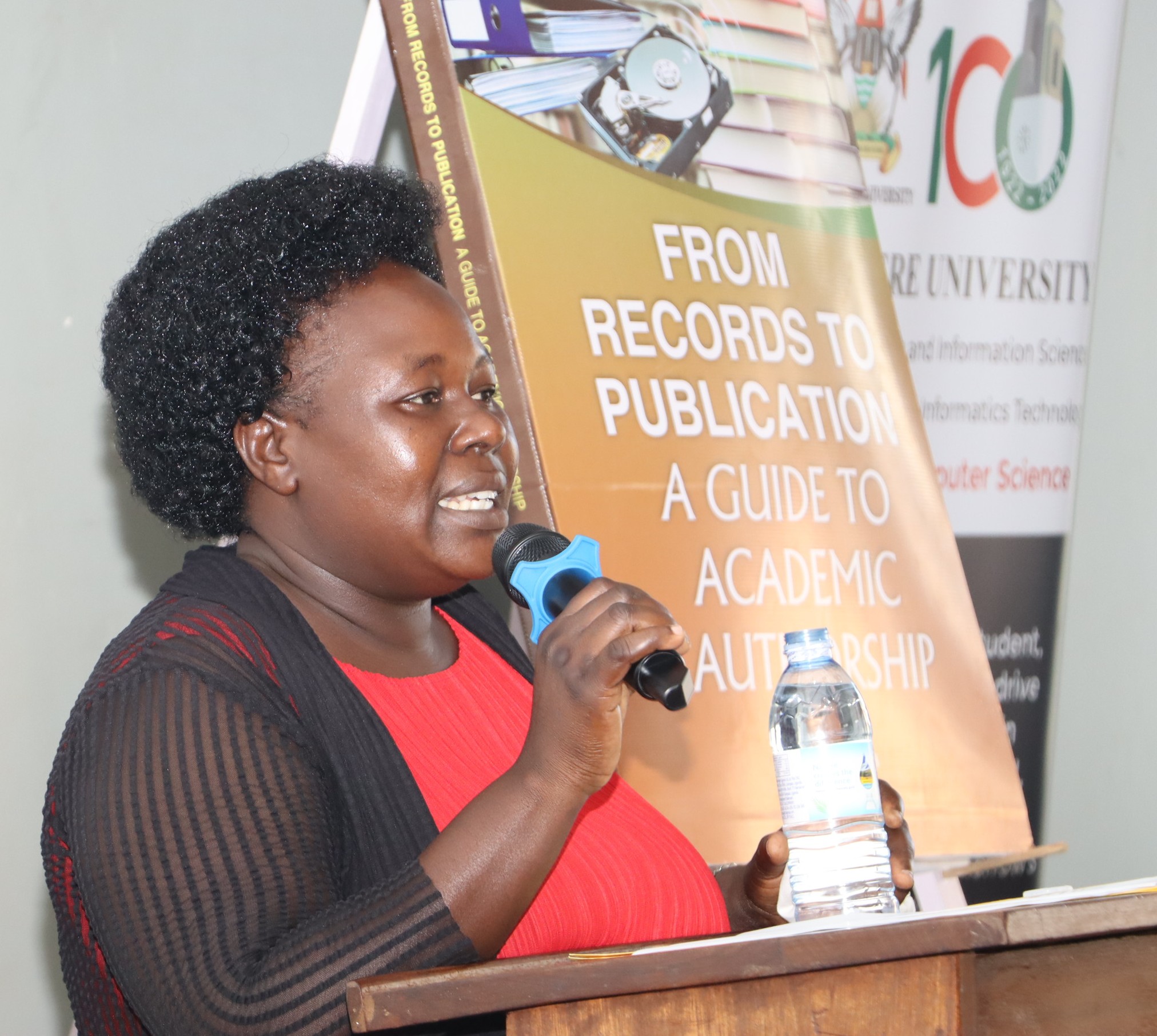
Dr. Sylvia Namujuzi, Head of the Department of Records and Archives Management, added, “This book is timely. It responds to real challenges faced by early-career researchers, postgraduate students, and even seasoned academics—questions of structure, authorship ethics, citation, collaboration, and navigating the publication ecosystem.”
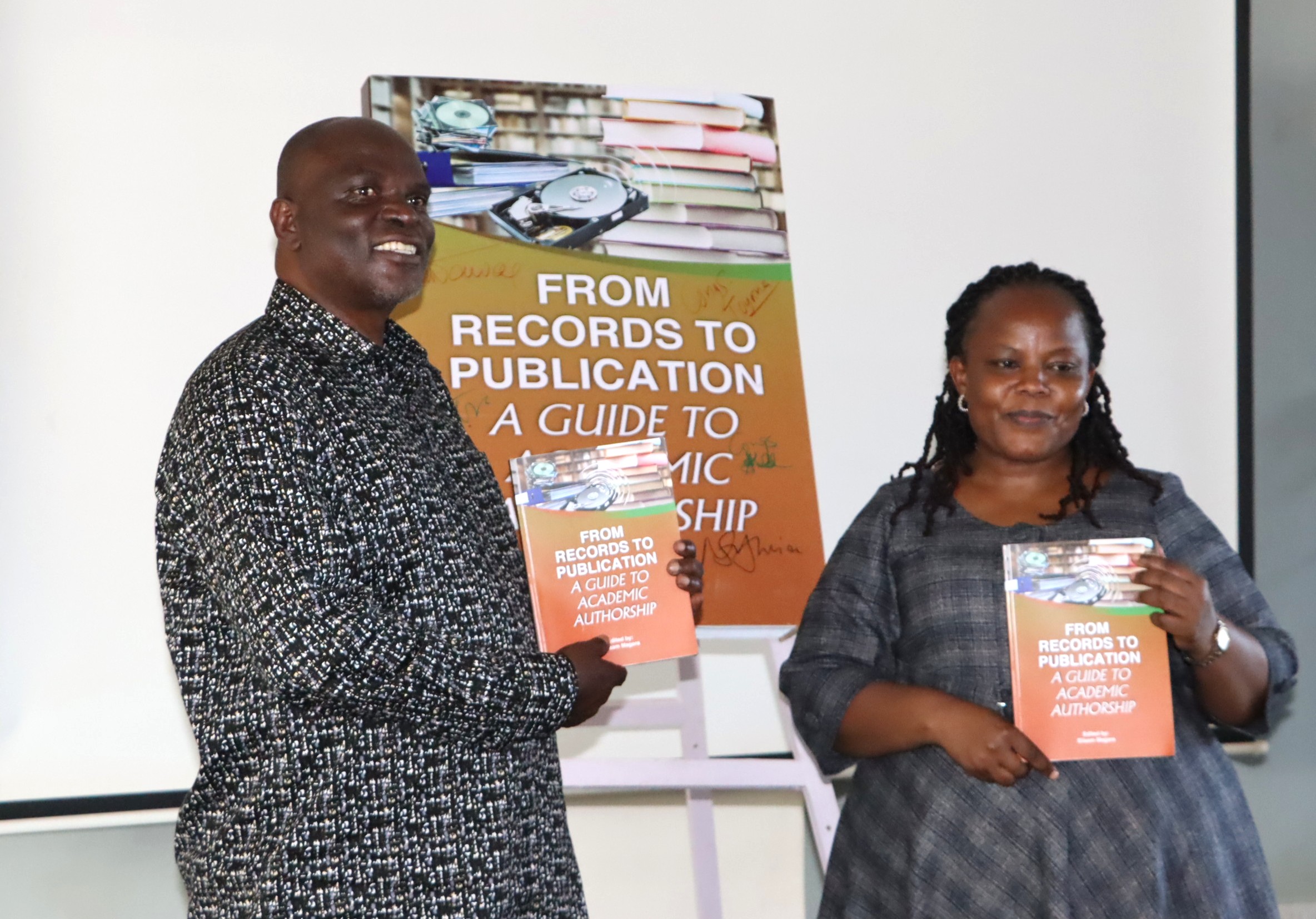
She concluded: “Well-managed records are not endpoints; they are the beginning of inquiry, reflection, and publication. This guide demonstrates that pathway.”
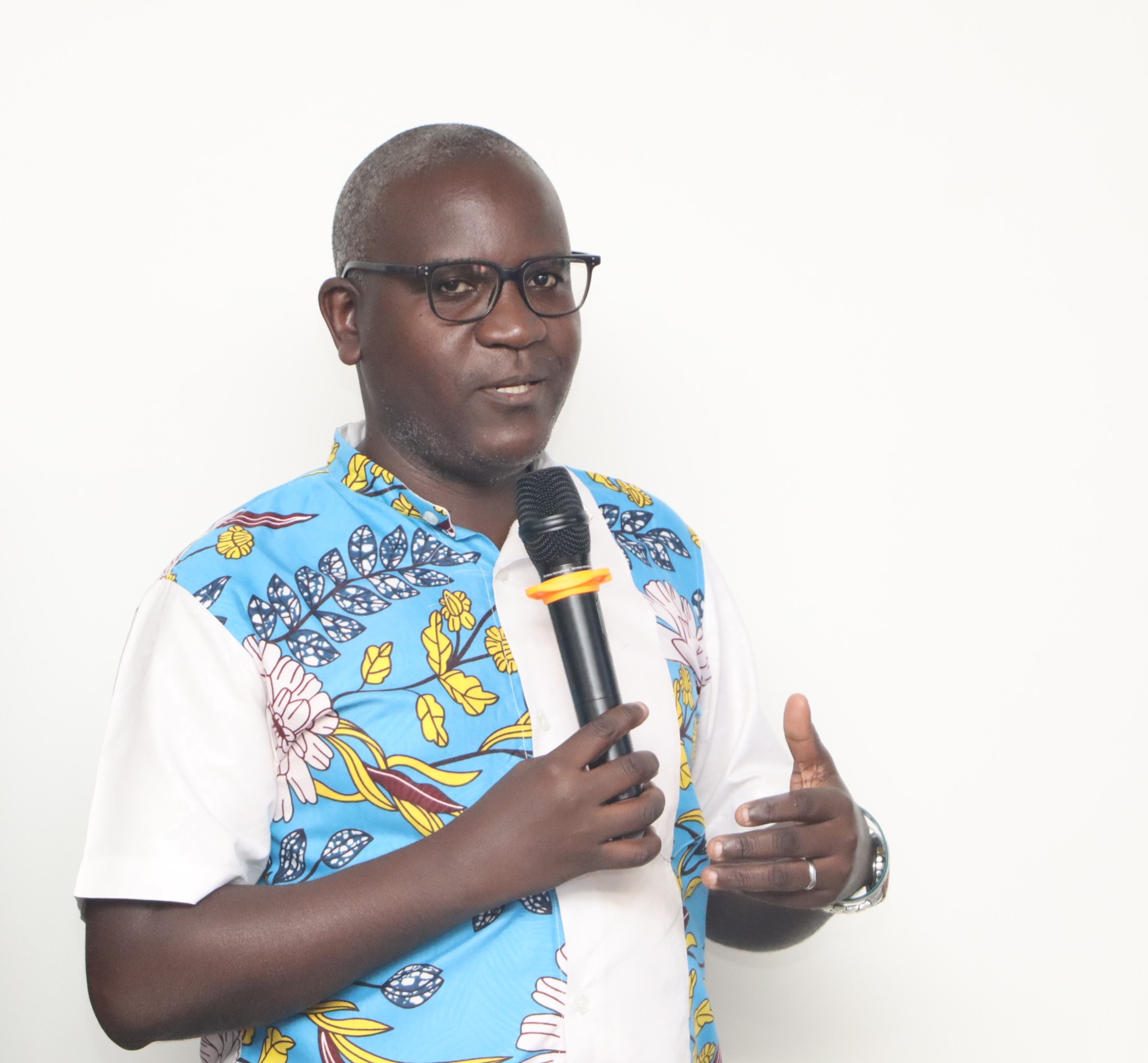
Book Outline
- Introduction: Publication Journey. (Prof. Elisam Magara)
PART I: Foundations of Academic Authorship.
- Conceptual Foundations of Academic Authorship
Elisam Magara and Joseph Kiplangat.
- Archives as a Source of Information for Academic Writing
David Luyombya, Sylivia Namujuzi and Francis Ekwaro
- The place of Oral History in Contemporary Writing
Elisam Magara, James Nkanshah-Obrempong and Nthan Nzyoka Joshua
- Managing Ethical Dilemmas in Academic Writing
Maria Tsvere, Tsitsi Kanonge and Joselin Chigwada
- The Role of Copyright and Neighbouring Rights in Protecting Works of Authors and Publishers in Uganda
Ronald Kakungulu Mayambala
PART II: Managing the Publication Process
- A Manuscript: From Inception to Publication
Sarah Mirembe Kyankya
- Managing Co-Authorship in Academic Writing
Gankhanani Moffat Moyo
- Managing Illustrations and Visual Artworks in Academic Writing
Bob Magara Rutatugirwa
- Tapping into Open Access Platforms for Gainful Authorship
George Muganga
- Managing the Costs in Academic Authorship
Aloysius Rukundo
- The Important Translation in Publication
Monica Mweseli
- Citations and Referencing in Academic Writing
Clement Lutaaya Nabutto, Namujuzi Sylivia, and Daviv Luyombya, Makerere University
- Referencing Management Software In Academic Writing
Odeke Moses Osamai and Constant Okello-Obura
- Compliance with International Bibliographic Control Standards in Academic Authorship
Elisam Magara and Dniel Osinde
PART III: Secondary Services in Academic Writing
- Journal Impact Factor and its Role when Submitting a Publication Article
Tonny J. Oyana and Caroline Ilako
- Managing Mentorship Programmes for Scholarly Writing
Diyoshak Rhoda Danladi and Elisam Magara
Report by
Jane Anyango, Principal Communication Officer CoCIS
Ritah Atukwatse, Journalism and Communication Student (2nd Year)
Fred Kanwagi, Journalism and Communication Student (3rd Year)
Computing & IS
CoCIS CIPSD Short Courses Jan-Mar 2026
Published
1 month agoon
January 19, 2026By
Mak Editor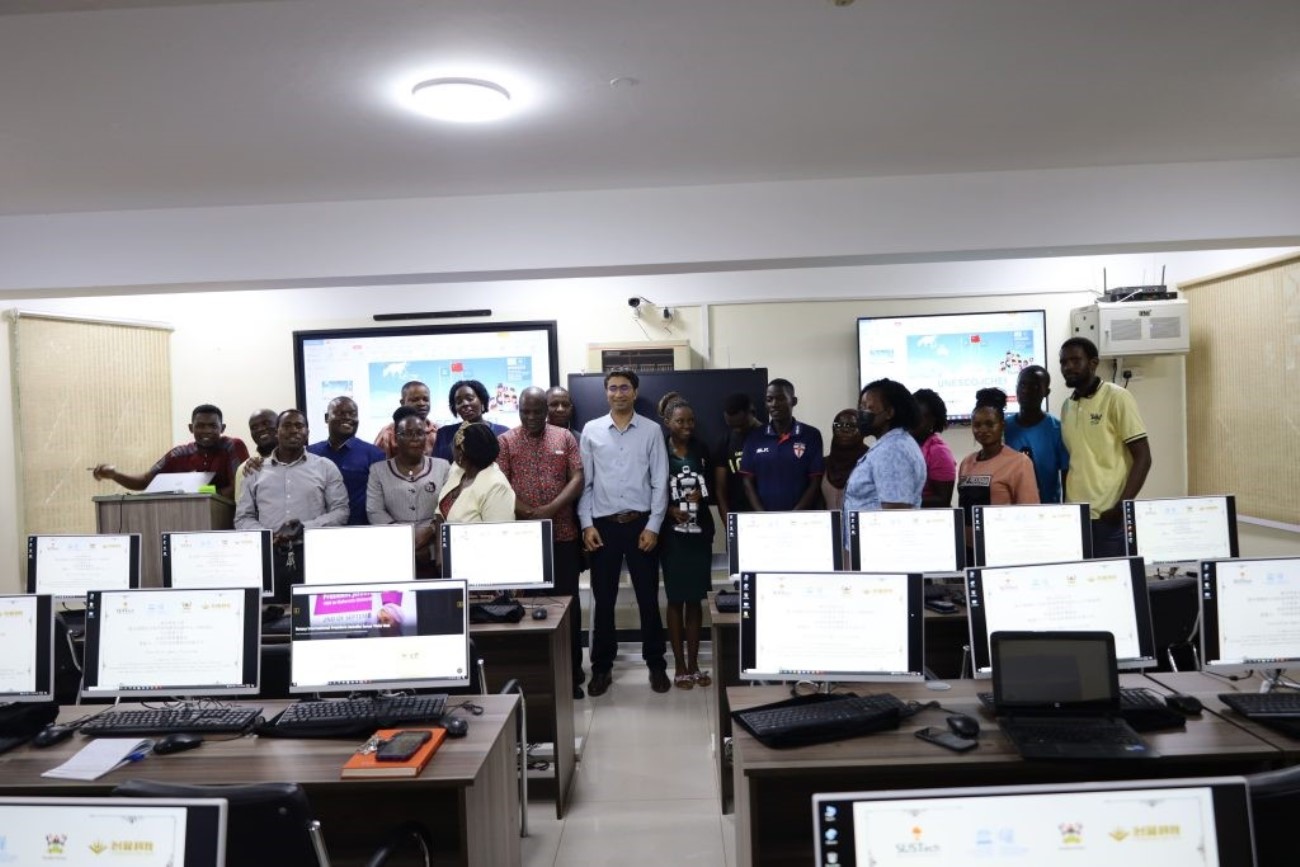
Makerere University College of Computing and Information Sciences (CoCIS) is the main ICT Training, Research and Consultancy Centre in Makerere University. The College has six Academic departments comprising of the Department of Computer Science, Department of Networks, Department of Information Technology, Department of Information Systems, Department of Library and Information Sciences, and the Department of Records and Archives management.
In addition to the mainstream degree programmes, CoCIS has a specialized Center for Innovations and Professional Skills Development (CIPSD) which delivers state-of-art training in ICT e.g. the Cisco Networking Academy for Cisco related courses, the Microsoft IT Academy Program for Microsoft related courses, International Computer Driving License course, Oracle Certified Training center for Oracle, Linux and Unix Training center. CIPSD also offers Machine Learning, Big Data Analytics, Data Science, Artificial Intelligence (AI) and Ethical Hacking as online courses. The College is an authorized Testing center, operating under PearsonVUE and Kryterion. Listed in the table (see download below) are the courses currently offered at the Center with their next start dates, duration, and cost.
- All courses are at affordable fees catering for Students, Vacists, Professionals and
- Anyone who wants to start a career in ICT or polish his/her ICT skills.
Contact Information
E-mail: psd.cis@mak.ac.ug
Tel: +256 782 512 897 +256 752 779964
URL: https://cocis.mak.ac.ug/cipsd/
Computing & IS
Makerere University and SoonPay Sign Landmark MoU to Champion Blockchain Innovation and Financial Inclusion Across Africa
Published
3 months agoon
December 9, 2025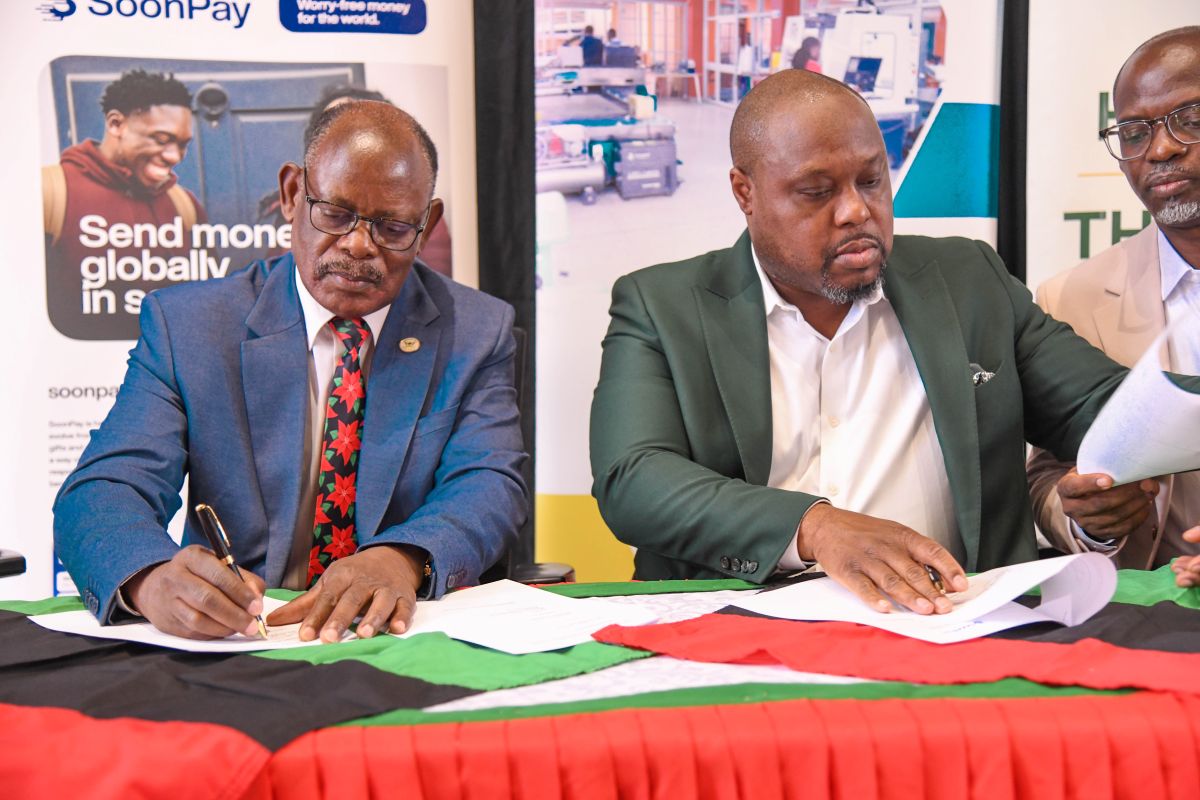
On Saturday 6th December 2025, Makerere University entered into a ground-breaking partnership with the U.S.-based fintech company SoonPay, marking a major breakthrough in Uganda’s push to integrate emerging technologies into research, innovations, higher education and national development.
The Memorandum of Understanding was signed by the Vice Chancellor of Makerere University, Prof. Barnabas Nawangwe and Mr. Frantz Morency, Chief Executive Officer of SoonPay L.L.C, during the Makerere University Financial Innovation Day, a high-energy event that brought together over 800 students, faculty, industry partners, and technology leaders.
The MoU institutionalizes the collaboration of Makerere University through the Makerere University Technology and Innovation Centre and SoonPay LLC. The signing ceremony was witnessed by Dr. Cathy Ikiror Mbidde-Manager of Makerere University Technology and Innovation Centre and Ms. Vuyani Jones-Blockchain Infrastructure Manager.
Organized by the Makerere University Technology and Innovation Centre (MUTIC) in partnership with SoonPay, the event ran under the theme “Innovation and Financial Inclusion for a Secure Future.” It featured keynote speeches, panel discussions, live demonstrations, and the signing of a Memorandum of Understanding (MoU) that will usher in a new era of blockchain training, research, and innovation at Uganda’s premier university.
The event was supported by several partners, including the National Social Security Fund (NSSF), the Uganda Blockchain Association, the National Planning Authority (NPA), Prudential Uganda, and other technology and financial sector stakeholders.
A Strategic Partnership to Transform Africa’s Digital Landscape
The newly signed MoU between Makerere University and SoonPay is expected to unlock a broad set of opportunities for students and academic staff. These include blockchain education and certification, joint research projects, internships and apprenticeships, the development of new financial inclusion tools, and the integration of emerging technologies into existing academic programs.
SoonPay’s entry into Uganda is part of a larger vision to expand blockchain-driven solutions across Africa—a continent its executives say has historically been excluded from global technological revolutions.

Impressed by the overwhelming numbers of students who filled the Yusuf Lule Central Teaching Facility Auditorium to the brim, the Vice Chancellor, said: “Dear students, by choosing to stay on campus, on a Saturday, and after completing your examinations, you have demonstrated your willingness to learn and embrace the blockchain technology as well as emerging technologies in general.”
Stating that blockchain technology is the future for Africa, the Vice Chancellor challenged the students to take charge of Africa’s digital transformation.
“You are the people to emancipate Africa from marginalization,” he declared. “What will liberate our continent is not politics—we have done too much of that. It is education, research, innovation, and technology.”
Prof. Nawangwe delivered a sweeping historical reflection, tracing Africa’s technological setbacks to the destruction of its civilization over several centuries.
“For 400 years, Africans were taken away as slaves. For another 200 years before that, our lands, knowledge systems, and technologies were disrupted,” he said. “This represents around 600 years of destruction and marginalization of African civilization.”
He urged students not to miss the opportunity that modern technologies such as blockchain and artificial intelligence present.
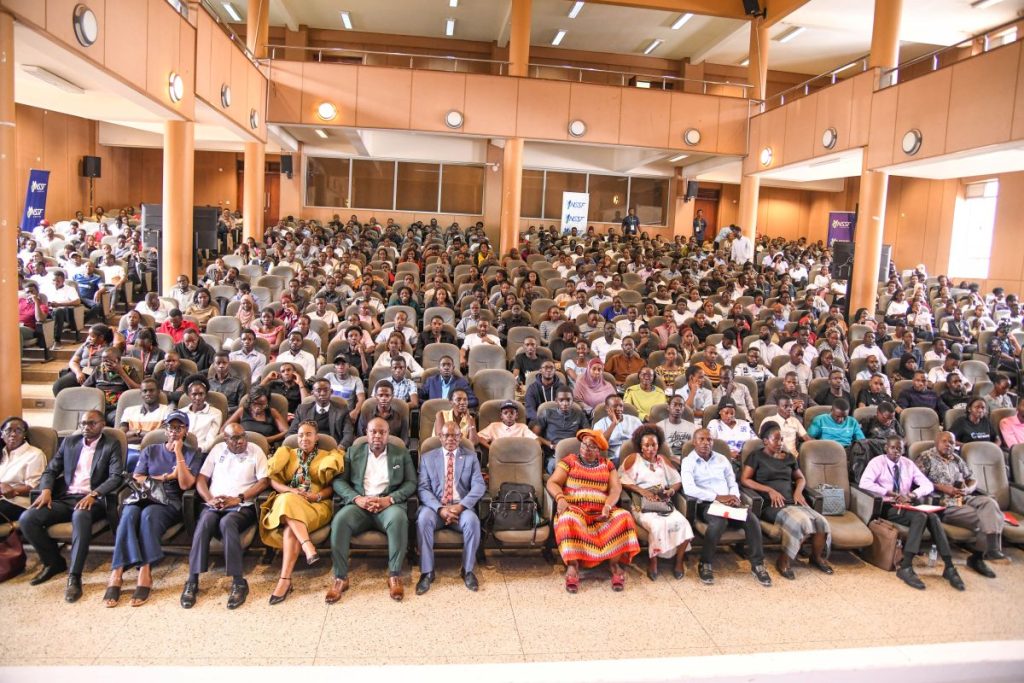
“We are lucky to be living in an era where Africa is free,” the Vice Chancellor said. “My hope is that we do not wait another 600 years to take advantage of this freedom. The most important resource we have is not minerals; it is human resources—you, the youth.”
Prof. Nawangwe reminded students that Makerere’s reputation as the “intellectual capital of Africa” places immense responsibility on their shoulders.
“You are among the very few Ugandans privileged to study at Makerere University. University graduates are not supposed to wait for jobs—you are the ones expected to create them,” he said.
Why Blockchain? Transparency, efficiency, and global competitiveness
The Vice Chancellor highlighted the transformative potential of blockchain technology, especially in improving financial systems—a sector he described as the backbone of any modern economy.
“Without efficient financial systems, nothing else works,” he said. “Blockchain offers transparency, reduces fraud, and minimizes corruption. If applied properly, it could transform how we manage finances, education, and even our natural resources, including the oil that Uganda is about to exploit.”
He added that Makerere’s students are already demonstrating global competitiveness in innovation, winning international competitions and creating products across multiple disciplines.
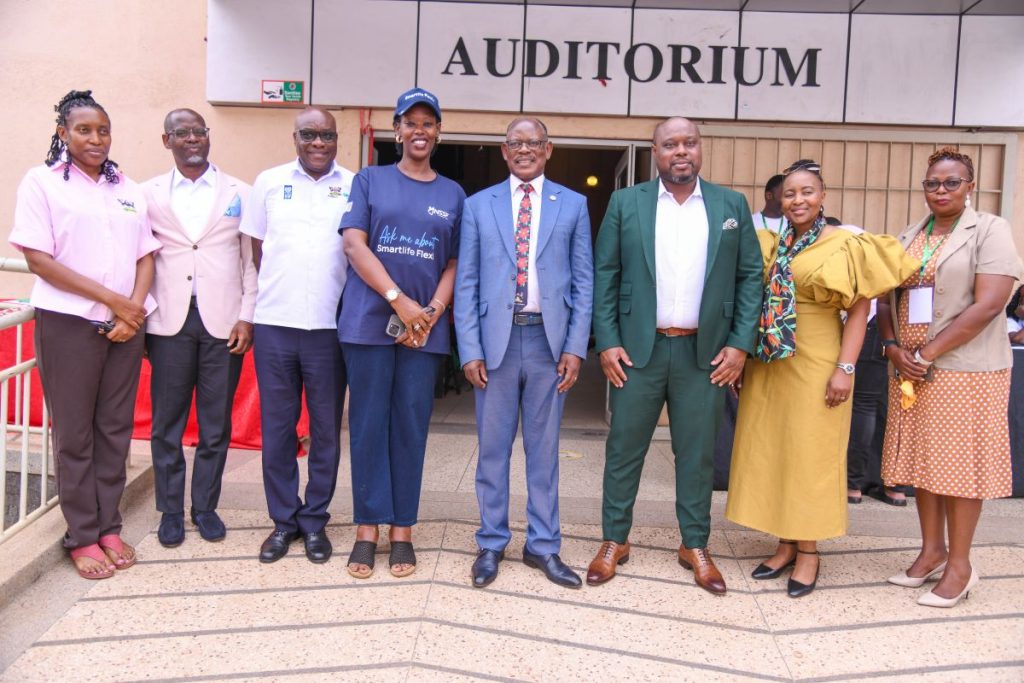
“The brains are here,” he said. “What we need is exposure to opportunities and technologies that will help you turn your ideas into impactful solutions.”
In a passionate keynote address, SoonPay CEO, Mr. Frantz Morency underscored why his company chose Uganda as its launchpad for blockchain adoption in Africa.
“As the Professor said, we have been excluded for more than 400 years,” he stated. “Even though we’re an American company, we know our roots. Look around the SoonPay team—you will see yourselves. We chose Uganda intentionally.”
Mr. Morency pointed to Africa’s dismal participation in the global blockchain economy. “In the U.S., blockchain generates $2.6 billion—61.7 percent of the world’s share. The rest of the world generates $1.6 billion. And Africa, just $14 million, or 0.33 percent,” he said. “That is unacceptable.”
He attributed the gap not to a lack of interest among young Africans, but to a lack of opportunity. “You want to learn—what you lacked was opportunity,” he said. “With the support of Professor Nawangwe, Dr. Cathy Ikiror Mbidde, and Dr. Margaret Nagwovuma, SoonPay wants to bridge that gap in education, technology, and economic opportunity.”
Mr. Morency also shared his personal journey, connecting his Haitian background to the aspirations of African youth.
“Many of you may see me as ‘the guy in the green suit,’ but I come from a small island—Haiti,” he said. “My mother never finished first grade; my father never finished second grade. What they gave me was integrity, work ethic, and the determination to seize opportunities when they came.”
He urged students not to seek opportunities abroad out of desperation, but to build meaningful careers in Africa. “Africa does not need to lose its talent. Why can’t you build here? Why can’t businesses, innovation, and prosperity thrive here?” he said. “Educate yourselves. Build. Create. Grow.”
A milestone for Makerere and Africa
Dr. Cathy Ikiror Mbidde, Head of the Makerere University Technology and Innovation Centre (MUTIC), described the event as a “major milestone” in the institution’s evolution.
“We are here to witness one of the key emerging technologies and to reflect on how universities can embrace such milestones,” she said. “Everyone has a role to play in transforming our lives through research, ideas, and projects.”
She thanked SoonPay for choosing Makerere University, noting that students had been “instrumental” in pushing for blockchain education.
“You have been constantly asking questions, pushing us, and showing deep curiosity about blockchain. Today, we finally have answers,” she told the students.
Beyond the speeches, the event showcased SoonPay’s blockchain infrastructure, student-led innovations, and a roadmap for integrating digital finance tools into university programs. Partners such as NSSF emphasized the importance of preparing young people for a digital future.
With the MoU now in force, Makerere University is positioning itself as a regional hub for blockchain education, research, and innovation. The partnership with SoonPay aims not only to train students but to shape Uganda’s—and Africa’s—next generation of tech leaders.
Trending
-

 Humanities & Social Sciences1 week ago
Humanities & Social Sciences1 week agoMeet Najjuka Whitney, The Girl Who Missed Law and Found Her Voice
-

 General1 week ago
General1 week ago76th Graduation Highlights
-

 Health2 weeks ago
Health2 weeks agoUganda has until 2030 to end Open Defecation as Ntaro’s PhD Examines Kabale’s Progress
-

 Agriculture & Environment2 weeks ago
Agriculture & Environment2 weeks agoUganda Martyrs Namugongo Students Turn Organic Waste into Soap in an Innovative School Project on Sustainable Waste Management
-

 General2 weeks ago
General2 weeks agoMastercard Foundation Scholars embrace and honour their rich cultural diversity
